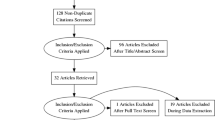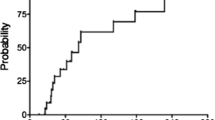Abstract
Background
Radiation-induced tumors (RIT) are increasingly recognized as delayed complications of brain irradiation during childhood. However, the true incidence is not established, their biology is poorly understood, and few guidelines exist regarding the long-term follow-up of irradiated children.
Methods
We studied retrospectively patients irradiated for brain tumor under 18 years and followed in our institution since 1970. RIT were defined as new masses, different from the original tumor, occurring after delay in irradiated areas, and not related to phacomatosis.
Results
Among 552 irradiated patients, 42 (7.6%) developed one or more RIT, 26 months to 29 years after irradiation (mean 12.8 years). The cumulated incidence was 2.0% at 5 years and 8.9% at 10 years. Of the patients, 73.8% were adult at the time of diagnosis of RIT, and 75% were diagnosed within 18.1 years after irradiation. We identified 60 cavernomas, 26 meningiomas, 2 malignant gliomas, 1 meningosarcoma, and 6 thyroid tumors. Compared with meningiomas, cavernomas appeared earlier, in children irradiated at an older age, and with a male predominance. Although RIT were correlated with higher irradiation doses, 80.9% of these occurred at some distance from the maximum irradiation field. Twenty-five lesions were operated in 20 patients; three patients died because of progression of the RIT.
Conclusion
A significant number of patients undergoing irradiation for brain tumor during childhood develop a RIT, often during adulthood. Our data suggest that radiation-induced cavernomas result from angiogenetic processes rather than true tumorigenesis. Protracted follow-up with MRI is warranted in children irradiated for brain tumor.






Similar content being viewed by others
References
Arita K, Kurisu K, Sugiyama K (2006) Nervous system tumors and atomic bomb experience of Hiroshima and Nagasaki. In: McLendon RE, Rosemblum MK, Bigner DD (eds) Russell & Rubinstein's Pathology of tumors of the central nervous system, 7th edn. Hodder Arnold, London, pp 51–56
Al Mefty O, Topsakal C, Pravdenkova S, Sawyer JR, Harrisson MJ (2004) Radiation-induced meningiomas: clinical, pathological, cytokinetic, and cytogenetic characteristics. J Neurosurg 100:1002–1013
Boljesikova E, Chorvath M, Hurta P, Steno J, Bizik I (2001) Radiation-induced meningioma with a long latency period: a case report. Pediatr Radiol 31:607–609
Cahan WG, Woodard HQ, Higinbotham NL, Stewart FW, Coley BL (1948) Sarcoma arising in irradiated bone. Cancer 1:3–29
Strojan P, Popović M, Jereb B (2000) Secondary intracranial meningiomas after high-dose cranial irradiation: report of five cases and review of the literature. Int J Radiat Oncol Biol Phys 48:65–73
Amirjamshidi A, Abbassioun K (2000) Radiation-induced tumors of the central nervous system occurring in childhood and adolescence: four unusual lesions in three patients and a review of the literature. Child’s Nerv Syst 16:390–397
Heckl S, Aschoff A, Kunze S (2002) Radiation-induced cavernous hemangiomas of the brain: a late effect predominantly in children. Cancer 94:3285–3291
Paulino AC, Ahmed IM, Mai WY, Teh BS (2009) The influence of pretreatment characteristics and radiotherapy parameters on time interval to development of radiation-associated meningioma. Int J Radiat Oncol Biol Phys 75:1408–1414
Salvati M, D’Elia A, Melone GA, Brogna C, Frati A, Raco A, Delfini R (2008) Radio-induced gliomas: 20-year experience and critical review of the pathology. J Neurooncol 89:169–177
Soffer D, Gomori JM, Siegal T, Shalit MN (1989) Intracranial meningiomas after high-dose irradiation. Cancer 63:1514–1519
Brada M, Ford D, Ashley S, Bliss JM, Crowley S, Mason M, Rajan B, Traish D (1992) Risk of second brain tumour after conservative surgery and radiotherapy for pituitary adenoma. Brit Med J 304:1343–1346
Lew SM, Morgan JN, Psaty EA, Lefton DR, Jeffrey AC, Abbott R (2006) Cumulative incidence of radiation-induced cavernomas in long-term survivors of medulloblastoma. J Neurosurg 104:103–107, 2 Suppl Pediatrics
Walter AW, Hancock ML, Pui CH, Hudson MM, Ochs JS, Rivera GK, Pratt CB, Boyett JM, Kun LE (1998) Secondary brain tumors in children treated for acute lymphoblastic leukemia at St Jude Children's Research Hospital. J Clin Oncol 16:3761–3767
Averbeck D (2009) Does scientific evidence support a change from the LNT model for low-dose radiation risk extrapolation? Health Phys 97:493–504
Lonser RR, Walbridge S, Vortmeyer AO, Pack SD, Nguyen TT, Gobate N, Olson JJ, Bobo RH, Goffman T, Shunang Z, Oldfield EH (2002) Induction of glioblastoma multiforme in nonhuman primates after therapeutic doses of fractionated whole-brain radiation therapy. J Neurosurg 87:1378–1389
Vinchon M, Dhellemmes P (2007) The transition from child to adult in neurosurgery. Adv Techn Standards Neurosurg 32:3–24
Duhem R, Vinchon M, Leblond P, Soto-Ares G, Dhellemmes P (2005) Cavernous malformations after cerebral irradiation during childhood: report of nine cases. Childs Nerv Syst 10:922–925
Strenger V, Sovinz P, Lackner H, Dornbusch HJ, Lingitz H, Eder HG, Moser A, Urban C (2008) Intracerebral cavernous hemangioma after cranial irradiation in childhood; incidence and risk factors. Strahlenther Onkol 184:276–280
Burn S, Roxana G, Phipps K, Gaze M, Hayward R (2007) Incidence of cavernoma development in children after radiotherapy for brain tumors. J Neurosurg (Pediatrics) 106(suppl 5):379–383
Loeffler JS, Niemierko A, Chapman PH (2003) Second tumors after radiosurgery: the tip of the iceberg or a bump in the road? Neurosurgery 52:1436–1442
Sasagawa Y, Akai T, Itou S, Iizuka H (2009) Gamma knife radiosurgery-induced cavernous hemangioma: case report. Neurosurgery 64:E1006–E1007
Mack EE (1999) Radiation-induced tumors. In: Berger MS, Wilson CB (eds) The gliomas. Philadelphia, Saunders, pp 724–735
Furuta T, Sugiu K, Tamiya T, Matsumoto K, Ohmoto T (1998) Malignant cerebellar astrocytoma developing 15 years after radiation therapy for a medulloblastoma. Clin Neurol Neurosurg 100:56–59
Hope AJ, Mansur DB, Tu PH, Simpson JR (2006) Metachronous secondary atypical meningioma and anaplastic astrocytoma after postoperative craniospinal irradiation for medulloblastoma. Childs Nerv Syst 22:1201–1207
Yang SY, Wang KC, Cho BK, Kim YY, Lim SY, Park SH, Kim IH, Kim SK (2005) Radiation-induced cerebellar glioblastoma at the site of a treated medulloblastoma. J Neurosurg 102(suppl 4):417–422
Nimjee SM, Powers CJ, Bilsara KR (2006) Review of the literature on de novo formation of cavernous malformations of the central nervous system after radiation therapy. Neurosurg Focus 21:E4
Czech T, Slavic I, Aichholzer M, Haberler C, Dietrich W, Dieckmann K, Koos W, Budka H (1999) Proliferative activity as measured by MIB-1 labeling index and long-term outcome of visual pathway astrocytomas in children. J Neurooncol 42:143–150
Simsek E, Yavuz C, Ustundag N (2003) Atypical meningioma and extensive calvarium defects in neurofibromatosis type 1. Pediatr Radiol 33:551–553
Amlashi SFA, Riffaud L, Brassier G, Morandi X (2003) Nevoid basal cell carcinoma syndrome: relation with desmoplastic medulloblastoma in infancy; population-based study and review of the literature. Cancer 98:618–624
Kantar M, Cetingu lN, Kansoy S, Anacak Y, Demirtas E, Ersahin Y, Mutluer S (2004) Radiotherapy-induced secondary cranial neoplasms in children. Childs Nerv Syst 20:46–49
Baumgartner JE, Ater JL, Ha CS, Kuttesch JF, Leeds NE, Fuller GN, Wilson RJ (2003) Pathologically proven cavernous angiomas of the brain following radiation therapy for pediatric brain tumors. Pediatr Neurosurg 39:201–207
Jain R, Robertson PL, Gandhi D, Gujar SK, Muraszko KM, Gebarski S (2005) Radiation-induced cavernomas of the brain. AJNR Am J Neuroradiol 26:1158–1162
Koike S, Aida N, Hata M, Fujita K, Ozawa Y, Inoue T (2004) Asymptomatic radiation-induced telangiectasia in children after cranial irradiation: frequency, latency, and dose relation. Radiology 230:93–99
Pozzati E, Giangaspero F, Marliani F, Acciarri N (1996) Occult cerebrovascular malformations after irradiation. Neurosurgery 39:677–684
Lee JW, Kim DS, Shim KW, Chang JH, Huh SK, Park YG, Choi JU (2008) Management of intracranial cavernous malformation in pediatric patients. Childs Nerv Syst 24:321–327
Pettorini BL, Narducci A, de Carlo A, Abet F, Caldarelli M, Massimi L, Tamburrini G, Di Rocco C (2009) Thyroid neoplasm after central nervous system irradiation for medulloblastoma in childhood: report of two cases. Childs Nerv Syst 25:631–634
Mathews MS, Peck WW, Brant-Zawadzki M (2008) Brown–Séquard syndrome secondary to spontaneous bleed from postradiation cavernous angiomas. AJNR Am J Neuroradiol 29:1989–1990
Makidono A, Kobayashi N, Saida Y, Manabe A, Kawamori J, Suzuki K (2009) Metachronous gliomas following cranial irradiation for mixed germ cell tumors. Childs Nerv Syst 25:713–718
Pettorini BL, Park YS, Caldarelli M, Massimi L, Tamburrini G, Di Rocco C (2008) Radiation-induced brain tumours after central nervous system irradiation in childhood: a review. Childs Nerv Syst 24:793–805
Kondziolka D, Kano H, Kanaan H, Madhok R, Mathieu D, Flickinger JC, Lunsford LD (2009) Stereotactic radiosurgery for radiation-induced meningiomas. Neurosurgery 64:463–470
Author information
Authors and Affiliations
Corresponding author
Rights and permissions
About this article
Cite this article
Vinchon, M., Leblond, P., Caron, S. et al. Radiation-induced tumors in children irradiated for brain tumor: a longitudinal study. Childs Nerv Syst 27, 445–453 (2011). https://doi.org/10.1007/s00381-011-1390-4
Received:
Accepted:
Published:
Issue Date:
DOI: https://doi.org/10.1007/s00381-011-1390-4




